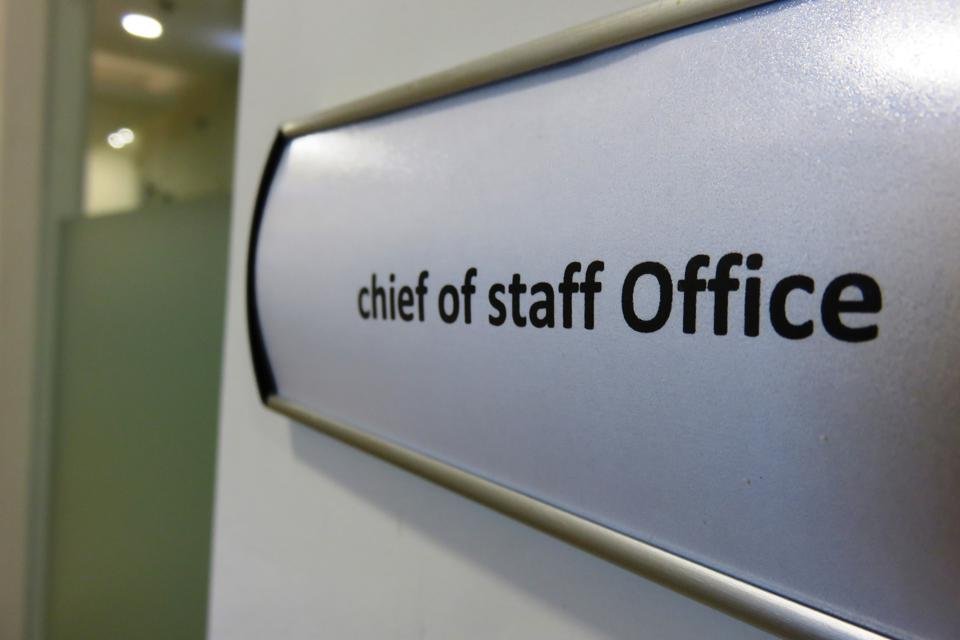Why Having A Chief Of Staff For A Family Business Helps Avoid Disasters
Chief of Staff -office entrance sign -GETTY
Why competent organizations, such as family businesses fail is the question that is the focus of much research especially so than in the case of the military. Eliot A. Cohen and John Gooch in their book “Military Misfortunes: The Anatomy of Failure in War,” Free Press, (©1990, 2006) discusses what the research on military disasters, including the attack on Pearl Harbor and the beginning of the Battle of the Atlantic. They also touch on the one missing element in many organizations, a good Chief of Staff.
Disasters do not occur because of the fault of one individual nor because of the collective fault of the people involved, but rather the failure of an otherwise competent organization to learn, anticipate or adapt, both individual leadership and the collective leadership of the organization. This means that a strategy, imposed from the top down, and multiple incremental changes, made opportunistically from the bottom up, might work for some organizations in some cases, but no one strategy works for all organizations nor in all cases. It is, therefore, necessary to focus on understanding how a specific organization works, find the specific core problems facing the organization these core deficiencies in learning, adaptation and anticipation that are the seedbed for misfortunes.
Learning from the Past: Organizations must track and analyze all data, hard and soft, in a manner that is neither slavishly accepting of the superiority of a model, nor equally unthinking in the reflexive “killing of sacred cows” in assumptions, traditions and the way things are done. Relentless empiricisms and a distain for a priori theorizing, must be prized within the organization. In the military, doctrine plays this role. For a family business, it can be through explicit and implicit governance.
Anticipation of the Future: No one makes 100% accurate predictions of the future 100% of the time. To anticipate the future, you must first anticipate the possible future risks that the organization may face. Some risks are due to the company’s own actions, some risks are due to events outside of their control. The organization can have a sense of future threats. Forewarned, the organization is mentally prepared to match the required actions to meet the possible, though unpredictable, future risks and opportunities. Having an organizational doctrine of Scenario Planning encourages holistic thinking, and avoids the narrow doctrinaire views.
Adapting to the Present: The role of leadership, at all levels, it to adapt to surprising events in real time. Leadership requires a balance between encouraging initiative on the part of subordinates and the ability to quickly intervene, short-circuiting the “chain of command,” if necessary. Family Business leadership also needs to ensure the participation of personnel management, in collaboration both within the business and within the family.
Organizations, such as the American Fleet at Pearl Harbor, are not inherently fragile, but weaken as a result of their failure to learn from the past, anticipate the future or adapt to the present. Similar to the military, neither the whole blame nor the whole praise for the failure or success of family businesses lies with the leadership or the collective family business organization.
Leadership must understand that there are flaws within the family business organization; and, a leader is willing to undertake the institutional risks to fix those flaws. This often requires leaders who are outside of the organization who has the ability to analyze the potential causes (real or imagined) of failure; help the organization learn from the failure; and, move forward based on what they learned from this new knowledge.
This is true whether at the strategic, operational, grand tactical or tactical level of leadership. Many times it requires more than just an Alpha leader but also a Beta leader, or a chief of staff from outside the organization, such as lawyer , accountant or other professional who is able to execute on the changes as they are needed. Indeed, the man who lead the Pacific fleet to victory after Pearl Harbor, Chester Nimitz, first served as the Chief of Staff a number of times before assuming this command.

